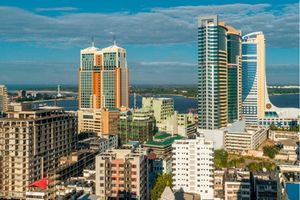Government push for English medium public schools sparks heated debate

What you need to know:
- While some see this as a step towards diversifying education choices for parents, others fear it could widen social inequalities within Tanzania’s education system.
Dar es Salaam. A heated debate has erupted among education stakeholders following the government’s decision to establish English medium public schools, a move that has drawn both praise and criticism.
While some see this as a step towards diversifying education choices for parents, others fear it could widen social inequalities within Tanzania’s education system.
The recent announcement by Dar es Salaam Regional Commissioner Albert Chalamila and Ubungo District Commissioner Hassan Bomboko to “upgrade” Ubungo National Housing Primary School into an English medium institution underscores the government’s intent.
However, this has sparked concerns among advocates like HakiElimu, an education watchdog, over potential repercussions.
For proponents of the initiative, public English medium schools present a viable alternative to private institutions, which often charge exorbitant fees. Parents like Sophia Amoni from Sinza applaud the government’s effort.
“I’ve always wanted my child to attend a quality school, but private schools were beyond my reach. Paying Sh400,000 annually for an English medium public school is manageable and gives my child a chance to excel,” she said.
However, critics argue that the move undermines Kiswahili as the primary medium of instruction, a policy cornerstone outlined in the Education and Training Policy of 2014 (updated in 2023). They also caution against fostering perceptions that English medium schools are inherently superior.
HakiElimu Executive Director John Kalage voiced these concerns. “The notion that schools teaching in English are better than those teaching in Kiswahili is not only misguided but also dangerous. It deepens social stratification and perpetuates inequality,” he said.
A 2024 report by HakiElimu highlighted stark differences between English and Kiswahili medium public schools. For instance, English medium schools had a better pupil-teacher ratio (PTR) of 1:55 compared to 1:63 in Kiswahili medium schools.
Similarly, their pupil-classroom ratio (PCR) stood at 1:47 versus 1:72 in Kiswahili medium institutions.
“These disparities make English medium public schools more appealing to parents, not because of the language but due to the better infrastructure and learning environment,” Dr Kalage said yesterday at a press conference in Dar es Salaam.
The government, however, has been defending the initiative, insisting it aims to broaden choices for parents while improving English language proficiency among students.
“We are not replacing Kiswahili medium schools; we are complementing them,” the Minister for Education, Science, and Technology, Prof Adolf Mkenda, said an recent interview.
“Parents now have three options: public English medium schools, private English medium schools, and Kiswahili medium public schools with enhanced English instruction.”
Prof Mkenda further clarified that under the new curriculum, English is taught from Standard One with a focus on communication skills. “By the end of Standard Seven, students should be able to confidently use English,” he emphasised.
He also addressed concerns about fees, noting that parents near English medium public schools are not obligated to pay unless they agree to contribute to additional resources.
Despite this assurance, many stakeholders remain sceptical about the affordability of these schools. An investigation by The Citizen revealed that parents pay between Sh300,000 and Sh600,000 annually for their children to attend public English medium schools.
“These fees exclude low-income families, forcing them to send their children to Kiswahili medium schools, which are often farther away,” said Dr Kalage.
For Mr John Juma, a resident of Kimara, the system feels discriminatory. “Education should be equal for all. Instead of creating tiers, the government should invest in improving all schools equally,” he said.
As the debate continues, experts call for a balanced approach to ensure equity in the education system. “We must eliminate the misconception that one medium is superior to the other. Both Kiswahili and English have their strengths, and the government should focus on strengthening both,” said Dr Kalage.
The government’s commitment to improving English teaching in Kiswahili medium schools is a step in the right direction.
However, education advocates warn that without addressing disparities in resources and infrastructure, the initiative risks deepening existing inequalities.
For now, the introduction of English medium public schools remains a contentious issue, with stakeholders urging the government to strike a balance that ensures quality education for all.





